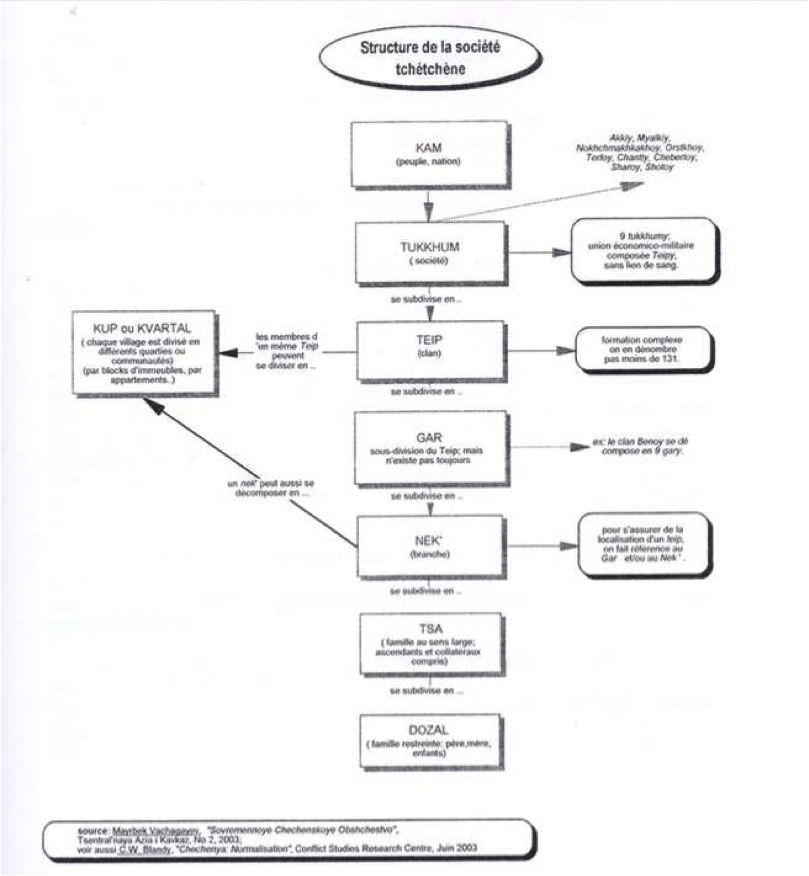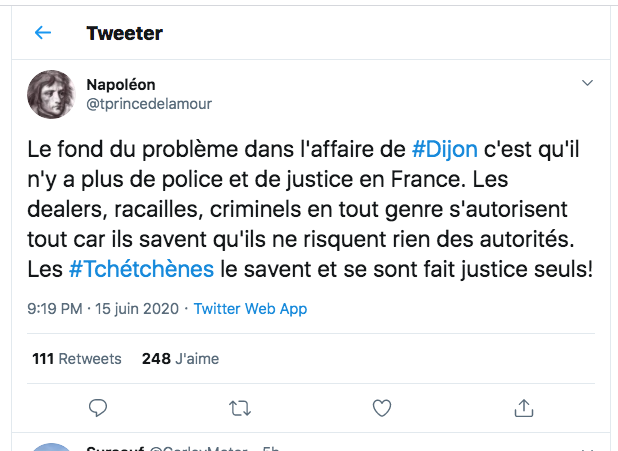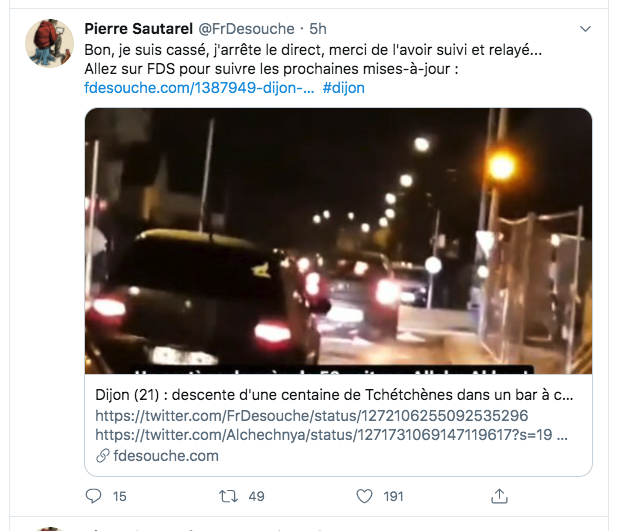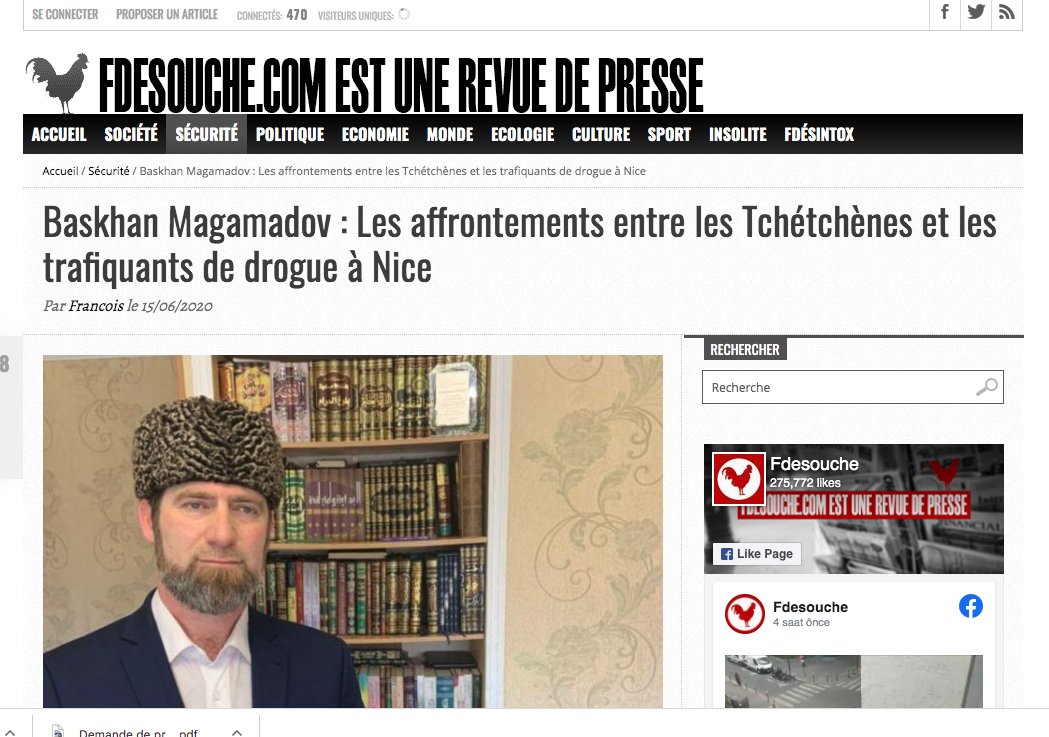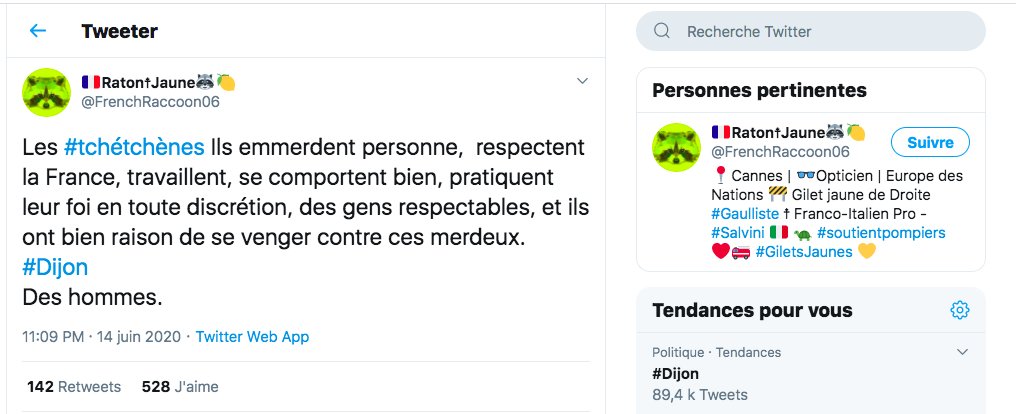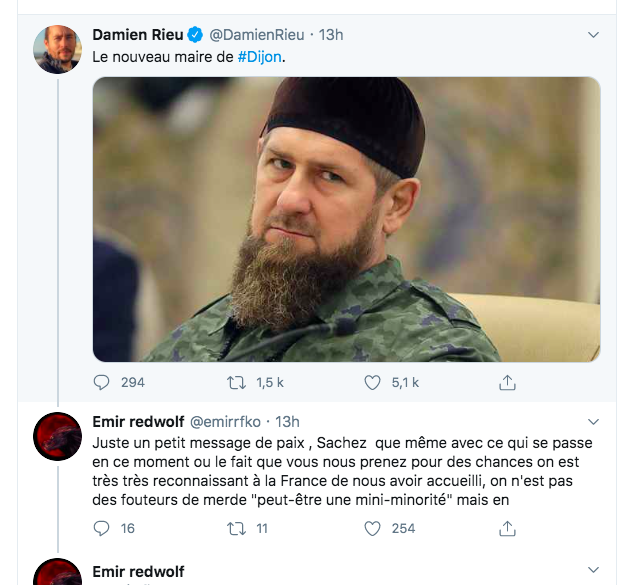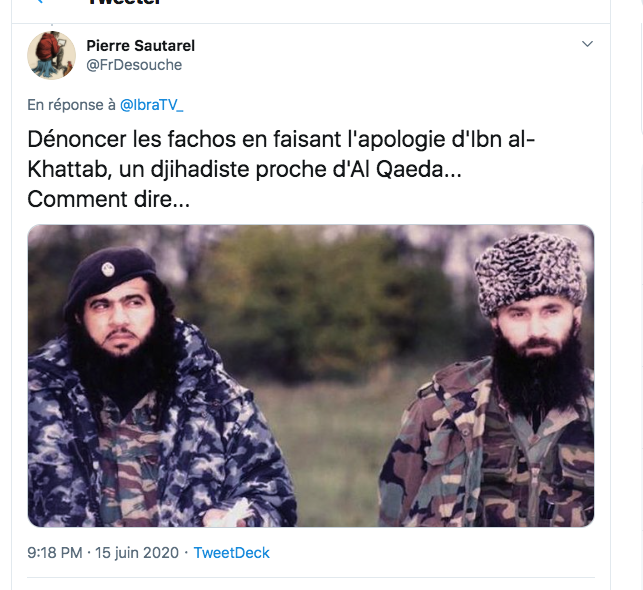So Chechens have been a trending topic all day in France, because of massive street fights in Dijon between young Chechens from all over the country and local men of North-African origin. People have been framing it as a "Chechens v. Arabs" fight, w/ the #Tchétchènes #Dijon
Numerous far-right accounts (among others) are passionate about it. I thought I'd take the opportunity to make a megathread that nobody will read until the end, about the Chechen diaspora, collective responsibility, street fights and the far-right's search for virility 

So here we go for part 1 : Social structures and the diaspora
So a few days ago in Dijon, 2-3 teenagers (incl. 1 Chechen) were attacked by a much larger group of older men, apparently Algerian, and apparently for stealing something. The Chechen boy suffered numerous injuries and is in a serious condition. https://www.francebleu.fr/infos/faits-divers-justice/conflits-et-violences-entre-les-communautes-que-s-est-il-passe-a-dijon-ce-week-end-1592163315
From what I've seen on Twitter his mom then made a facebook post about it, which rallied members of the diaspora in France and beyond to come to Dijon in order to get revenge for the boy.
Now I don't want to sound too orientalist here, but that won't come as a surprise for anyone familiar with Chechnya. The Chechen society traditionally has a clanic/tribal structure, unfolding on different scales along patrilinear lineages :
There's the individual, then his immediate family, then his extended family, a few intermediate structures, then his teip (clan), then the teip's tukkhum (clan union), and then the Chechen people. This diagram (by M. Rechova w/ material from @Vatchagaev) sums it up well
These social structures are the ones in which collective responsibility is exponentially exercised : the individual is responsible before his family, teip and people, but his family is also responsible for him before his teip, his teip before his people, etc.
With collective responsibility comes a string sense of honor : one must behave in a way that will honor his family, teip and nation, otherwise he will be disrespecting and bringing shame to all of these entities.
Reciprocally, if someone behaved in a wrong way, it's up to the family, the clan and sometimes the whole nation to take responsibility for it and try and right the wrong. And if someone was hurt or disrespected, the same structures are entitle to seek reprisal or compensation.
Given the Chechens' terrible history of uprooting, this tribal system, which initially had a strong geographic base, has lost a lot of its weight. The family of course remains primordial, and the teip somehow retains some relevance - but nothing too deterministic.
The tukkhums, except in some special cases (Orstkhoy tukkhum/nation for ex.) have lost significance. In the meantime, other structures have gained importance, such as the village (still teip-related tho) and the congregation (and not tarîqa or vird)
This has been made increasingly visible the last few years with Kadyrov's instrumentalization of public humiliation combined to collective responsibility for governance/ population control purposes.
When "structures" are being asked to denounce and repel one of their own, it's typically the family, the village/city or the mosque (or in the mosque), and more rarely the teip.
For example, Akhmed Zakayev's family was asked to denounce him because teip "banishment" wasn't enough https://echo.msk.ru/programs/beseda/1707430-echo/
Or this meeting w/ young "extremists" from Argun in the Сердце Матери mosque with all of their relatives https://grozny-inform.ru/news/society/68968/
Or this meeting w/ young "extremists" from Argun in the Сердце Матери mosque with all of their relatives https://grozny-inform.ru/news/society/68968/
My opinion is that the diaspora in itself has become, not a structure per se, but at least a scale in which identity is performed and collective responsibility is exercised. Even though it is very diverse socially and politically (w/ prominent opponents and pro-Kadyrov Chechens)
The diasporan space in itself can be broken down in several scales : there's the diaspora as a whole, the XIXth-century-era diaspora in the Middle East, the post-war European diaspora, the diaspora in Austria, Norway or France, in Strasbourg, Nice or Toulouse
And to each diasporan scale, its own features and problems. Kadyrov has repeatedly threatened the "Chechens in Europe" and has indeed carried on exactions on a European scale : opponents have been threatened, attacked and killed in Poland, Austria, France, etc.
On a local scale, local problems unfold, and often along "ethnic" lines : I've heard of clashes between the Nice Chechens and the Marseilles Armenians, or of general resentment between Chechens and "Arabs" (meaning French ppl of North-African descent) in Strasbourg.
Now I can't and won't elaborate as to the "why of these clashes or resentments. But each community suffers from a number of stereotypes that were attached to them, mainly in post-colonial contexts - whether French or Post-Soviet.
These discourses travel and exist way beyond the context in which they emerged. French/NA people will have a global image of "brave Chechen fighters", "crazy mountaineers", "obedient Muslims" or "guys who love to fight, with 'recognizable' hairstyles and machine guns".
Of course this representation is not always very politically informed and a lot of people easily associate Kadyrov with all Chechens and diaspora Chechens, even though most would oppose him.
A propos, this very famous rapper Kaaris made a song called "Kadirov" (sic), the line goes "Kalashnikov, Ramzan Kadyrov", which pretty much sums the stereotypes about Chechens and the fear/fascination they exert
On the other hand, Chechens have also a very complicated and stereotypical vision of the "Arabs", a denomination that will in their representation generally include both people from the Middle-East and from North Africa.
People in Chechnya have asked me if we "were doing ok in France with all the Arab migrants-terrorists coming in" - because that's what's on Russian TV, because what Russian TV does best is exporting European far-right discourses for their domestic audiences.
Some are grateful for the help "they" provided during the Chechen wars, others blame them for the confessionalization of the conflict.
Being non-Chechen and non-North African, I can only speak about what I read or was told. These are just examples that ofc shall not be essentialized or generalized.
These stereotypical discourses stem from a long history of domination on both sides and, in a French context, contributes to sustaining a certain "rivalry" between the two diasporas (especially on the Chechen side).
Said rivalry acts as the background of events such as the clashes in Dijon in which (this is my point), the main drama was not really about Chechens v. Arabs but, about collective responsibility exercised in the (French) diasporan space and on the diasporan scale.
But naturally, it is the ethnic component that gets the most publicity and is then diversely read and instrumentalized by far-right and alt-political whatever french twitter accounts ! Which leads me to part 2 : the framing of Chechens within our current political discourse
A quick disclaimer : I'm way less competent here than with the whole clanic system study so this will be amateurish feel free to correct me if you are an alt right specialist or even an alt right person who knows!
So from my personal (non-researched) perspective, the Chechen diaspora in France seeks to fit into that "modern minority" narrative, though on its own terms and fashions. I would frame that as yet another performance of collective responsibility and representation
Today's events have been widely discussed by far right/nationalist/traditionalist Twitter accounts. Many decided to side with the Chechens. Why ? They are getting rid of the "scum" (la racaille) and "seeking justice themselves" when the French state is failing.
This also echoes a previous case : in April, Chechens living in Nice decided to "clean" their neighborhood from the drug dealers that had set up shop there, and things rapidly escalated to the point of a shooting. https://www.leparisien.fr/faits-divers/a-nice-dealers-et-tchetchenes-en-pleine-guerre-froide-07-05-2020-8312241.php
Though technically unrelated, the protagonists are the same (Chechens v. drug dealers) and the two events have been linked discursively. But things in Nice have also re-escalated this week-end. The Chechens were saying they would go to Nice after Dijon. https://www.francebleu.fr/infos/faits-divers-justice/tensions-entre-communaute-tchetchene-et-dealers-a-l-est-de-nice-les-habitants-des-liserons-1592229048
For example, the French website Fdesouche, whose main activity is to offer a news review of events and articles carefully catered to fit their far-right nationalist and traditionalist editorial line. The founder has been tweeting all day about the street fights in Dijon.
A few hours ago, he integrated on his site this interview with a Chechen community leader from Nice that was originally published on Tergam (a Chechen information portal in France) in April. https://tergam.info/2020/04/26/baskhan-magomadov-les-affrontements-entre-les-tchetchenes-et-les-trafiquants-de-drogue-a-nice/?lang=fr
Magamadov goes : "We came to France to be able to live peacefully, work, raise our children, educate them and give them culture. Obviously, it was hard for Chechens to tolerate this mess, the hope was that the authorities would take measures and reestablish order".
The tone of the interview is clear : Chechens in Nice want to protect their families from the drug traffic that plagues their neighborhood. Fdesouche publishes it more than a month after the events in Nice as he deems it relevant to understand and frame the events in Dijon.
The replies on Fdesouche's tweets oscillate (roughly) between "France is ridden by Muslim gangs, we need to get rid of both", "the Chechens are right to take matters into their own hands that's their die-hard mountain mentality" and
"if only us French had such a sense of community and pride, then we could also defend ourselves against the 'racaille'" (by which they mean North-Africans)
@Paugog also pointed out that some far-right accounts (la fachosphère!) have started fantasizing about Kadyrov, his "ethnic and racial solidarity" and his cosplaying as a medieval knight. But there's still one problem : Islam ! https://twitter.com/Paugog/status/1272531798560583686
For this other account, the Chechens are hardworking, well-behaved, discreet practitioners of their faith and so their are right to seek revenge. Men !
This other far-right leader, on the angry side, joked about Kadyrov becoming mayor of Dijon (we're deep into municipal elections). A Chechen answered with a "peace message", stating that they are grateful to France for welcoming them, hardworking, and just want to be in
solidarity with their young one who was attacked by older North-African ("Maghrébins") guys. He also deplores that "New France" has lost this solidarity spirit. His replies are full of messages showing support and esteem, from far-right accounts and others.
My favorite one : "The Chechens behaved in Dijon like the French did in the 1950s-60s, before a dramatic degeneration in Virility" (with a capital V, and a Putin profile pic)
So we had our far-right temporarily fantasizing on the virility, bravery and sense of community and self-preservation that Chechen men show. Sadly, this convergence is, I believe, coming to an end.
A few hours ago, our most famous French-Chechen (actually Ingush) influencer, @IbraTV (a youtuber and prankster) made a video in which he asked for the Chechens to differentiate between the 'racaille' who targeted the boy and the rest of the "Arabs". https://twitter.com/Lautfi_91/status/1272517938264903685
He reminded that Arabs are brothers, that Khattab was an Arab, and that it is the fascists ('les fachos') that are trying to divide Chechens and Arabs. https://twitter.com/IbraTV_/status/1272523599069491203
OF COURSE the far-right was not going to let this (very) low-key Al Qaida appreciation tweet slide. The video, although a one-man initiative, invalidates the "good Chechens v. bad Arabs" narrative that some of them had been somehow sustaining all day.
The replies are full of young Chechens and "Arabs" agreeing on solidarity, and that a group of men hitting a 16yo kid is wrong anyway. They're also laughing about his accent and the way he pronounces "pouce bleu" (blue thumb) as "poce blo", which is is gimmick. Back to normal!
This tweet is a good conclusion. This journalist mapped the tweets and RTs under the hashtags #Dijon and #Tchétchènes, and found out that they were essentially a monopoly of far-right accounts, which is not a surprise. https://twitter.com/EloiseBajou/status/1272591353285955585
People are making fun of them saying they started by romanticizing Chechen vigilantes but stopped when they realized they were Muslims too. Then they move towards the "Muslim gang war on our French territory" side of the narrative.
As the public debate is on police brutality and disarming the police, they use this story in every aspect possible, from "Chechens do what the French and the police won't" to "there are men with machine guns on the streets so the police actually needs more weapons and power"
Ironically enough, as the tensions in Dijon were rising tonight with the "Arabs" starting to gather weapons and the police on site, the Chechens in the end didn't come for the final confrontation, because their elders asked them not to. https://twitter.com/Alchechnya/status/1272700505203105793
So, collective responsibility is always the answer !!!
For french-speakers, this is a great complement to my thread, using technology/social media as the entry point. https://twitter.com/vincentglad/status/1273229574302765057

 Read on Twitter
Read on Twitter